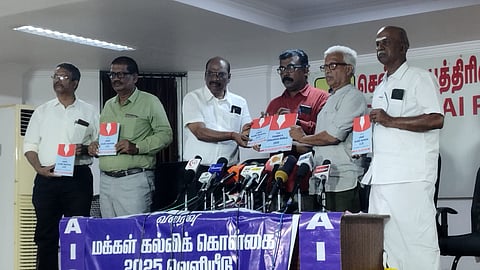

Protesting the National Education Policy (NEP) 2020, the All India Save Education Committee (AISEC) – an organisation that advocates for equitable access to education – on Thursday, May 22, released the draft of People’s Education Policy (PEP) 2025, positioning it as a counter to the NEP.
According to AISEC, this alternative policy is meant to reaffirm the principles of equity, democracy, and scientific temper in India’s education system.
In a statement, AISEC criticised NEP 2020 as promoting privatisation, commercialisation, and what it called an “anti-scientific” approach to learning. The committee described the PEP as an inclusive and democratic alternative, developed through wide consultation and intended to address the shortcomings of the current national policy.
Among its key recommendations, the PEP advocates for education in the mother tongue with English as a second language, while opposing the NEP’s three-language formula. Former Head of the Department of Politics and Public Administration at the University of Madras, D Ramu Manivannan said that it is the right of every child to be educated in their native language. He also argued against the imposition of any particular language. The NEP mandates introduction of a three-language formula (Hindi, Tamil and English) which is seen by the Tamil Nadu government as a covert push for Hindi imposition.
Manivannan also raised concerns about public education funding, noting that the University Grants Commission (UGC) has reduced institutional funding by 20–30 percent. He criticised the Union government’s alleged growing control over education policy, arguing for a constitutional amendment to return education to the State List to allow greater autonomy to regional governments.
The PEP draft opposes the current centralised entrance examinations such as the Central University Entrance Test (CUET) and the National Eligibility cum Entrance Test (NEET), recommending instead that universities manage their own admission processes.
Another major point of contention is the NEP’s proposal to introduce vocational education from the sixth standard. The AISEC argues that early vocational tracking could lead to children being limited to traditional family occupations, thereby perpetuating social and economic inequalities. While not rejecting vocational education entirely, the PEP warns against the “vocationalisation” of education at the cost of broader intellectual development.
Manivannan also expressed concern over the increasing privatisation of higher education, citing the proliferation of autonomous universities and courses that charge high fees, even as public funding is reduced. He warned that this trend is creating unequal access to quality education.
The PEP also calls for the rejection of the Right to Education Act, 2009, which guarantees free and compulsory education until age 14, proposing instead to extend this to age 17. It further advocates retaining the 10+2 school system and the traditional three-year undergraduate degree model, as well as reinstating the MPhil programme — all of which are being revised or phased out under the NEP.
The draft policy also takes a strong position against the Indian Knowledge System (IKS) component of NEP, labelling it as “pseudo-scientific” and as an attempt to distort historical narratives.
AISEC has called for widespread public consultation on the draft and has invited feedback from various sections of society. The final version of the People’s Education Policy is expected to be debated and discussed at a National People’s Parliament scheduled to take place in Bangalore in 2026.
The PEP proposes that educational institutions be established in remote and underserved regions, aiming to make education genuinely accessible to all.